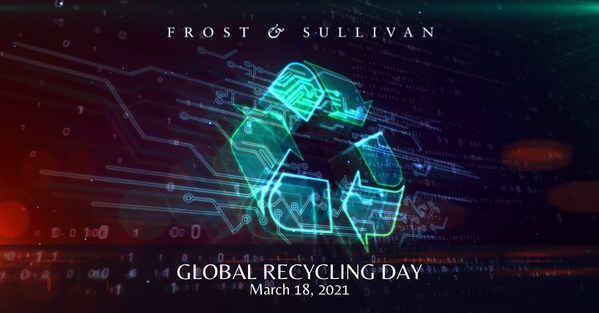In honor of Global Recycling Day, Frost & Sullivan highlights circular economy and how companies can shift toward the concept of zero waste
SANTA CLARA, Calif., March 18, 2021 /PRNewswire/ -- On Global Recycling Day, Frost & Sullivan recognizes that waste streams are expanding at a skyrocketing pace as economies advance with rapid industrialization, better standards of living and technological innovations.

The surging use of electronic equipment to simplify consumer lifestyles poses a threat to human and environmental safety as products are designed with a greater focus on affordability over longevity. As a result, 2020 generated 53.5 MMt of eWaste; 78% of this waste remains uncollected and undocumented, raising concerns about the efficient handling of end-of-life products, according to Frost & Sullivan's recent analysis on the global waste electrical and electronic equipment (WEEE) recycling market.
Driven by strict policies to build a circular economy and a push toward the implementation of extended producer responsibility (EPR) in developed and emerging economies, the global WEEE recycling market is estimated to garner a revenue of $4.68 billion by 2025 from $3.85 billion in 2020, registering a compound annual growth rate (CAGR) of 3.9%.
For further information on this analysis, Circular Economy and Growing Scarcity of Materials with Intrinsic Value to Transform the Global WEEE Recycling Market, please visit: http://frost.ly/5gq
"The alarming rise in eWaste volumes is forcing manufacturers, distributors, and retailers to explore new business models. This has brought circular electronics under the spotlight wherein manufacturers focus on developing and promoting the use of recycled and refurbished electrical and electronic products," said Kiravani Emani, Energy & Environment Research Analyst at Frost & Sullivan. "Additionally, circular economy and the concept of zero waste are fundamental to build a safe, resilient, and sustainable environment, and this underscores the significance of repair, reuse, and recycle of products, all of which lead to a reduction in waste and eWaste."
Emani added: "With EPR policies being instrumental, leading electrical and electronic equipment enterprises are offering buybacks, charging advanced recycling fees (paid by the consumer upfront during product purchase), and selling refurbished products as part of their business strategies to improve product lifecycle and gain a stronger foothold in the market. Further, as emerging countries like India, China and parts of Africa are considering adopting EPR policies, these new business models are likely to witness sharper growth in the next five to seven years."
As developed and developing economies focus on recovery and reuse of rare and highly valuable metals and minerals, market participants should focus on five strategies to encourage sustainability and tap growth prospects in eWaste management:
Circular Economy and Growing Scarcity of Materials with Intrinsic Value to Transform the Global WEEE Recycling Market is the latest addition to Frost & Sullivan's Energy & Environment research and analyses available through the Frost & Sullivan Leadership Council, which helps organizations identify a continuous flow of growth opportunities to succeed in an unpredictable future.
About Frost & Sullivan
For six decades, Frost & Sullivan has been world-renowned for its role in helping investors, corporate leaders and governments navigate economic changes and identify disruptive technologies, Mega Trends, new business models, and companies to action, resulting in a continuous flow of growth opportunities to drive future success. Contact us: Start the discussion
Circular Economy and Growing Scarcity of Materials with Intrinsic Value to Transform the Global WEEE Recycling Market
MFF2
Contact:
Jaylon Brinkley
Corporate Communications
T: +1.210.247.2481
E: Jaylon.Brinkley@frost.com
Photo - https://mma.prnasia.com/media2/1458922/frost_sullivan_global_recycling_day_2021.jpg?p=medium600